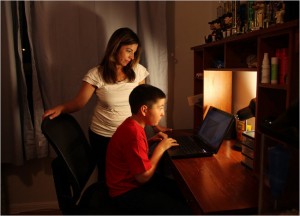
Guess you'll have to lie about your age
by Rosemina Nazarali
KiwiCommons.com
Kiwi Commons is a late-breaking news, guides and information weblog dedicated to providing readers with the most relevant and up-to-date resources available on youth Internet safety. Kiwi provides readers with a broad range of thoughts and opinions from various experts, including their own Kiwi Expert Panel, to real life stories of the youth affected by these new challenges like sexting, scams, cyberbullying and predators.
It comes as no surprise that a good portion of Facebook users lie about their ages. It does come as a surprise, however, that almost half of all 12-year-olds in the U.S. use social networking websites, despite the site requiring a minimum age of 13.
With no mechanisms in place to detect when a person is lying about their age, there’s no telling who or how many under-agers are actually using Facebook. However, Facebook has taken notice and is kicking out about 20,000 users each day, many of whom are among the 12 and under crowd.
“Facebook uses various methods to identify underage accounts, including the monitoring of information placed on the site and community reports from other users,” said Facebook’s Chief Privacy Advisor, Mozelle Thompson.
With this, however, comes an array of new questions, this time for the parents. Would you let your child lie about their age to sign-up for a social network? This is the hypothetical question that has been burning up the Internet since last week, and many of the differing answers are quite surprising.
“Not only are kids lying about their age, but more often than not, parents teach them to lie about their age,” said Danah Boyd, a social media researcher for Microsoft.
So I became curious. I wanted to know what parents on the Internet were saying about the matter, and what the justification was for either allowing or not allowing their kids to sign-up for Facebook.
Crisntina Flores, a 44-year-old mother to an 11-year-old boy said she did allow him to sign-up for Facebook because she feared he would sign-up behind her back anyway. Her son, Jake, told Facebook he is 15. “It’s not like there’s a legal limit for being on the Internet,” Flores said.
15 of 30 students in one of Jake’s fifth-grade classes are all on Facebook. “It’s lying — and about age,” said the class’s teacher, Aundrea Kaune. “What happens when they want to drink beer?”
“Allowing kids to lie by creating a profile with a false age…is a different issue than allowing activity online that, frankly isn’t even appropriate offline,” one parent, Cameron Sullivan, told the DublinPatch. “Some of my contacts on Facebook have middle-school kids whose pages are open to friends of friends. I don’t have time to waste monitoring other kids’ lives online, but on the rare occasions that I venture to their kids’ pages, I am grateful for the parents’ ignorance. The ability to see what kids are posting online provides a window into the goings-on of some middle-school kids.”
Another parent, Kari Kulac, who let her fourth-grade daughter sign-up for Facebook is starting to question her decision. “It’s only been a couple of months, but I’m unsure whether I should let her continue, not because of safety fears but because it is yet another time suck that has to be monitored along with all the other frivolous electronic pastimes (TV, etc.). I’d rather she be running around outside,” Kulac said. “The benefits, I suppose, are the social enjoyment she has getting to better know my out-of-state side of the family, including my 87-year-old grandmother.”
But it’s not just Facebook kids are fibbing on. Victoria Lai, a ninth-grade student in San Francisco, said she signed up for Yahoo! Games when she was just in the second-grade. “I always say I was born in 1986, not 1996, because it’s just one number different. Easy to remember.”
Victoria’s father, Brian Lai, says that kids “have to experience using the Internet. It’s the future.” He added, “it’s not good to lie, but you can make an exception.”
May Jay Hoal of Yoursphere brings up a point. “Parents can’t forget that Facebook was created by adults and for adults, and the adult culture that lives on Facebook is usually one that we likely wouldn’t expose our children to in the ‘real world.’”
One thing many of these Facebook users who aren’t quite honest about their age don’t realize, is that once you’ve signed up with a certain birth date on Facebook, it cannot be changed. So unless you plan on opening a new account after you hit the age of 13, you’ll be stuck appearing as the wrong age you originally input for a very long time.
After reading what all the parents had to say, I went to Kiwi Commons expert, Doreen Nicastro, to find out how she felt about young people using Facebook before they were ready.
“From both a developmental and safety standpoint, no kids under the age of 13 should have a Facebook account, period end of story,” she said. “Parents are being manipulated and bullied by their own kids to get access to social networking. The fact of the matter, it’s against Facebook terms of agreement for kids under the age of 13!”
Nicastro suggests that the adults start communicating with each other. “Parents, schools and law enforcement in communities across the world need to come together and discuss the rules of the social networking road. New tools require new rules. The problem is that schools are shutting it down, parents are too busy and stressed to get engaged, and kids are running the show.”
While parents and young people continue the ongoing argument surrounding social media use, Facebook is looking for a solution for their under-age users. They are currently considering creating a safe social network for the 12 and under population — a place meant just for kids and a way to dissuade them for signing up for Facebook before the required age.
We want to know — would you let your kids lie about their age to engage on social networking websites like Facebook?













